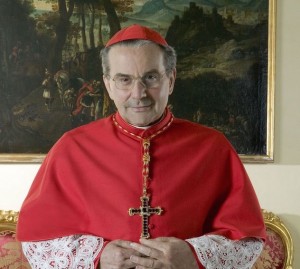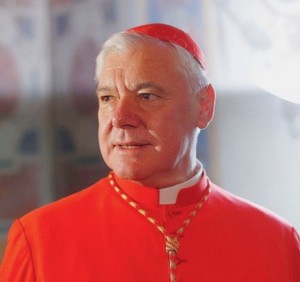Two recent interviews with prominent Cardinals have advanced efforts to derail Cardinal Walter Kasper’s proposal that Holy Communion be given to people in invalid “second” marriages. Cardinal Carlo Caffarra, Archbishop of Bologna, spoke to Il Foglio. Cardinal Gerhard Müller, Prefect of the Congregation for the Doctrine of the Faith, gave a lengthy interview to the French Catholic weekly Famille Chrétienne. Both made clear that there can be no change in sacramental discipline without, in effect, denying the indissolubility of marriage.
If Holy Communion could be legitimately given to the invalidly remarried (Kasper’s proposal), the Church would no longer consider them bound to the exclusive and lifelong fidelity inherent in Christ’s own intentions for marriage. The “first” marriage would somehow have to disappear in order for its obligations likewise to disappear. The only possible alternative would be to designate “second” marriages as “legitimate and authorized adultery,” which I doubt even Cardinal Kasper would be willing to do.
But if the Church were ever to say after the October Synod that, while reaffirming the indissolubility of marriage, an exception could allow some divorced and “remarried” Catholics to receive Communion, the average parishioner would say: “The Catholic Church either no longer believes that marriage is indissoluble, or it no longer believes that adultery is gravely sinful.”
Caffarra states clearly that this debate is not merely a merciful scaling back of unrealistic expectations imposed on the flock, who sometimes find themselves in unhappy “first” marriages. The essence of marriage is at stake: “When I speak of the truth of marriage I do not mean some sort of normative ideal. I mean, rather, the truth that God in his creative act has inscribed upon the person of every man and woman. Christ teaches us that before considering particular cases, we must know what it is we are talking about. Here we are not talking simply about a norm that may or may not admit of exceptions, nor of an ideal after which we strive. We are talking about the very essence of marriage and the family.”

He continues: “The indissolubility of marriage is a gift that is given by Christ . . .Above all it is a gift, not a norm that is imposed. It is not an ideal after which they have to strive. It is a gift from God who never reneges on his gifts. It is not by accident that Jesus founds his revolutionary response to the Pharisees on a divine act: ‘That which God has united,’ he says. It is God who unites, otherwise the definitively binding nature of the act would rest upon a desire that is yes, natural, but also impossible to achieve. God himself gives the completion of the act.”
Müller echoes Caffarra’s words: “we should underline that it is not correct or sufficient to present the indissolubility of marriage as an ideal, a law, a ‘value’. Marriage is before all else a sacrament, an efficacious sign that communicates grace. Through it, God constitutes a new reality, the matrimonial bond.”
Müller goes further: “Christian doctrine is not a theory about reality, but rather revealed truth. . . .Thus there is no distinction to be established between doctrine and pastoral practice. We are not saved in Jesus Christ by a theory; rather we participate in the grace, in the life of God. We should live in the new reality, accepting the Cross, and the concrete difficulties that go with it, throughout our life.”
Caffarra also addresses Kasper’s suggestion that the invalidly remarried undergo a period of penance before being admitted to Holy Communion: “The Church forgives but the condition of this forgiveness is repentance. But repentance in this case involves returning to the first marriage. It isn’t sincere to say: ‘Although I repent, I choose to maintain that state which in itself constitutes the breaking of the bond, of whose breaking I repent.’”
For Caffarra, a simple question remains: “Those who make these suggestions have not, at least up until now, answered one simple question: what happens to the first valid and consummated marriage? If the Church admits them to the Eucharist, she must render a judgment on the legitimacy of the second marriage. It’s logical. But. . .what about the first marriage? The second marriage, if we can call it that, cannot be a true second marriage because bigamy is against the teaching of Christ. So the first marriage, is it dissolved? But all the popes have always taught that the pope has no authority over this. The pope does not have the power to dissolve a valid and consummated marriage. The proposed solution seems to imply that although the first marriage continues, the Church can somehow legitimate a second relationship. But. . .the proposal demolishes the foundations of the Church’s teaching on sexuality.”

Müller calls on the Church to remain faithful to Christ’s clear teaching: “We must be obedient to the word of Jesus Himself. When he was asked if it were permitted for a man to repudiate his wife, Jesus replied: No! ‘If a man divorces his wife and marries another, he commits adultery.’ When people encounter difficulties, they should do everything they can to overcome them, seeking to become like Christ crucified, who rises from the dead on Easter. They should seek help and support in their efforts. But we cannot say that our pastoral practice should improve on that of Jesus Himself!”
Meller stresses that Catholic doctrine and discipline form a necessary unity: “The discipline of the sacraments is the expression of the doctrine of the Faith. These are not two different domains. One cannot affirm a doctrine and then initiate a practice that would be contrary to the doctrine.”
Clearly, defenders of indissolubility have both Revelation and logic on their side. The notion that a divorced and invalidly re-married Catholic can simply excuse himself from fidelity to his marriage vows, undergo some public penance similar to that practiced in the early Church, and then present himself for Holy Communion is offensive to the very words of the Incarnate God. It cannot be otherwise – the clear teaching of Christ is being cast aside in the name of a pseudo-reconciliation.
The Church takes a Catholic at his word when he makes his vows, freely and knowingly, at his wedding. The Church must likewise call him to lifelong faithfulness to that vow, for the marriage vows bring into existence a permanent union that is joined together by God. In no way can the Church “erase the tape” on someone’s marital history and then pretend to take him as his word when he makes his wedding vows a second time. Marriage either is what Christ taught us it is, or it means whatever you want it to mean. The Kasper proposal is a deathblow to the integrity of the Christian understanding not only of marriage, but of reality itself. Caffarra and Müller understand exactly what is going on here.















